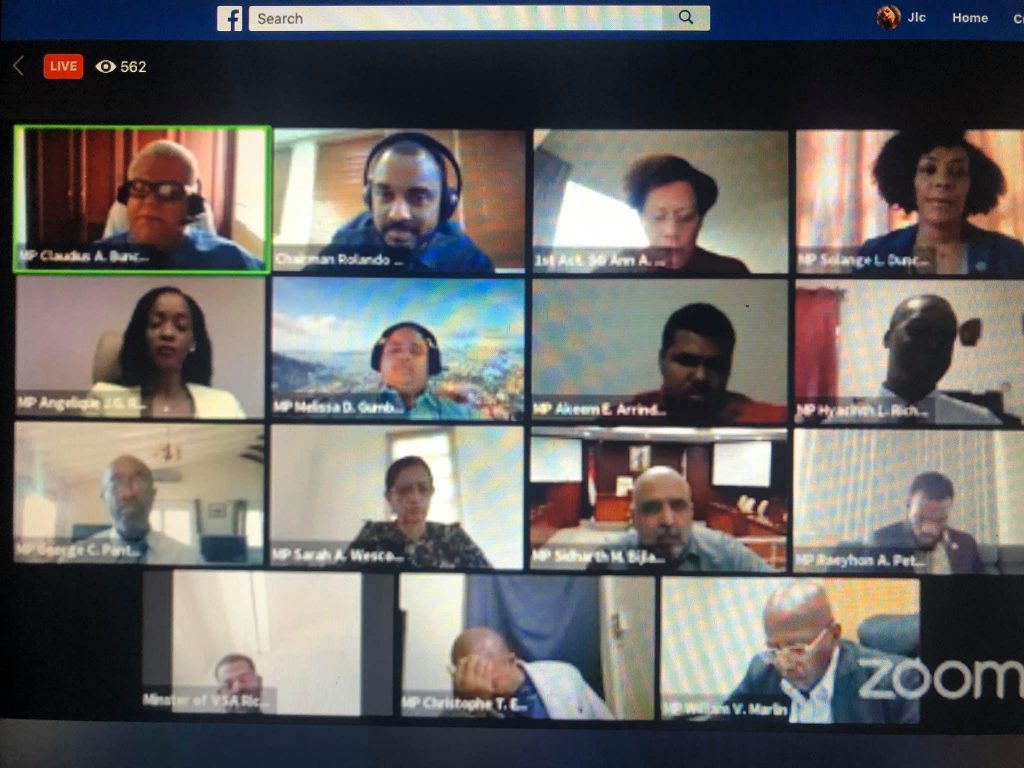MPs discuss stimulus plan

“No loans but grants and no conditions” ~
PHILIPSBURG – No loans but grants, and above all no conditions. Those were some of the sentiments expressed by parliamentarians during a digital central committee meeting about the government’s Stimulus Relief Plan. However, grants are not going to happen and conditions are not going to go away.
MP Omar Ottley made reference to the Marshall Plan, the American aid package for the reconstruction of Europe after the Second World War. “There were no stipulations for this. They assisted with no conditions,” Ottley said.
Other MPs joined this chorus. MP George Pantophlet: “We don’t want loans but grants.” MP Christophe Emmanuel; “I am tired of their conditions. Let us borrow on the open market and put the Cft aside.”
The truth is that the United States did not come up with the Marshall Plan out of the goodness of its heart. The Americans feared that an economically weakened Europe would be an easy prey for Russia and its communist doctrine. And therefore, Uncle Sam freed up $15 billion to help rebuild Europe. Enacted on April 3, 1948, the Marshall Plan was a 4-year program designed to reconstruct cities, industries and infrastructure on the continent. The Netherlands received $1.1 billion from the program.
But the American help came at a price. Countries that wanted to qualify for the help had to sign a bilateral pact with the US that committed them to the pursuit of balanced budgets, the restoration of internal financial consolidation and the stabilization of exchange rates at realistic levels. Furthermore, the pact promoted European integration and free trade. “More important than financial aid was the restoration of business confidence,” Professor Anthony Mueller, a senior Fellow of the American Institute for Economic Research, writes in an analysis of the Marshall Plan.
More than seventy years after it was put in place, the lesson from the Marshall Plan is according to Mueller that “poor countries must implement domestic economic reforms that do away with state interventionism, corruption and clientelism and liberate the economy from the yoke of bureaucracy and cumbersome taxation.” In other words, Mueller makes the case for pro-market reform as the best way to rise from the ashes after a major disaster.
That message has not yet arrived in St. Maarten, where politicians focus very much on the financial aid from the Netherlands and – if that aid is not forthcoming – what the alternatives are.
MP Emmanuel was very vocal about it. “Call Danny (Ramchandani), call Corallo, call Südi (Özkan), call McSood, call Ansary and call former Minister Gibson,” he said. “They have money and if they don’t they know where to get it.”
MP Claudius Buncamper asked whether landlords will qualify for support from the stimulus plan as they are confronted with tenants that are unable to pay their rent. Supporting landlords would stop them from evicting such tenants, Buncamper reasoned. He also pointed out that the maximum support of 1,150 guilders per employee is below the minimum wage.
MP Sidharth Bijlani questioned the decision to exempt supermarkets, car dealers and garbage collectors from financial support and he had another question: “How many undocumented people are on the island and what do we do for them?”
MP Raeyhon Peterson also expressed concerns about the exemptions and wondered on which basis some companies ended up on this list. “Support should be for everyone in need. Why not apply it across the board?” Peterson mentioned in particular daycare centers, pre-schools and construction companies as entities that need support while they currently do not qualify based in the list of exemptions.
MP Sarah Wescot-Williams tackled a statement made by Finance Minister Ardwell Irion in an answer to written questions, whereby he claimed that parliament has lost its authority during the state of emergency. “That is wrong. The government will have to give account to the parliament.”
Wescot-William suggested one set of criteria to determine who qualifies for financial assistance instead of the arbitrary list of exemptions. “You fit those criteria or you don’t.”
MP William Marlin put his finger on St. Maarten’s reality. “This is not going to last three months or even six months. We are in this for a very long time and we have to brace ourselves for rough times ahead and everybody has to sacrifice. Companies will die, small businesses will die. And hundreds will be standing at the end of the line, waiting for their checks.”























